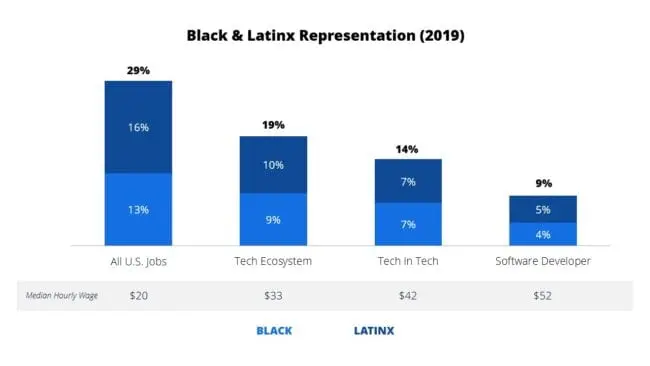Driving Change: A Closer Look at Apple’s Racial Equity Initiatives

As the world becomes increasingly interconnected, companies must recognize the importance of diversity and inclusion. The tech industry, in particular, has faced significant criticism for its lack of racial equity. However, Apple, one of the leading tech giants, has proactively addressed this issue. In this article, we will delve into Apple’s racial equity initiatives and explore their impact on promoting diversity and inclusivity within the company and the broader tech industry.
Table of Contents
The Need for Racial Equity in the Tech Industry

The tech industry has long been criticized for lacking diversity and inclusion. Historically, people of colour have been underrepresented in tech companies, with limited career growth and advancement opportunities. This lack of representation not only inhibits innovation but also perpetuates systemic inequalities. Companies must recognize the need for racial equity and take meaningful steps to address this issue.
Overview of Apple’s Commitment to Racial Equity
Apple has been at the forefront of promoting racial equity in the tech industry. The company understands that diversity and inclusion are essential for fostering innovation and reflecting its diverse customer base. To that end, Apple has made a public commitment to address racial equity within its workforce and beyond. The company believes embracing diversity can create a more inclusive and equitable tech industry.
Apple’s Partnerships and Collaborations for Racial Equity
Apple recognizes that it cannot tackle the issue of racial equity alone. It has actively sought partnerships and collaborations with organizations that share its commitment to diversity and inclusion. These organizations can leverage their collective resources and expertise to drive meaningful change by working together. Apple’s collaborations range from educational initiatives to mentorship programs to increase representation and opportunities for people of colour in the tech industry.
Key Initiatives and Programs by Apple for Promoting Racial Equity

Apple has implemented several key initiatives and programs to promote racial equity. One such initiative is the “Apple Developer Academy,” which provides coding and app development training to underrepresented communities. This program equips participants with valuable skills and opens doors to career opportunities in the tech industry. Additionally, Apple has established the “Supplier Diversity Program,” which ensures that diverse suppliers have equal access to business opportunities within the company’s supply chain.
Impact and Success Stories of Apple’s Racial Equity Initiatives
Apple’s racial equity initiatives have significantly impacted individuals and communities. By providing training and mentorship opportunities, the company has empowered countless people of colour to pursue careers in tech. These initiatives have also fostered a sense of belonging and inclusion within Apple’s workforce, increasing employee satisfaction and productivity. Success stories abound, with individuals from underrepresented backgrounds achieving remarkable career growth and contributing to the tech industry.
Challenges and Criticisms Surrounding Apple’s Efforts
Apple has faced challenges and criticisms surrounding its racial equity initiatives despite its commendable efforts. Some critics argue that the company’s initiatives need to be more far-reaching and that more needs to be done to address systemic inequalities. Others question the authenticity of Apple’s commitment, highlighting instances where the company needs to catch up in its diversity and inclusion goals. Apple acknowledges these criticisms and continues to evolve its approach to ensure meaningful and lasting change.
Future Plans and Goals for Apple’s Racial Equity Initiatives
Apple recognizes that the journey towards racial equity is a continuous one. The company has outlined plans and goals to build upon its existing initiatives. This includes expanding its partnerships and collaborations, increasing representation at all levels of the organization, and fostering a culture of inclusion and belonging. Apple aims to be a role model for other tech companies, setting a precedent for the industry to prioritize racial equity and take concrete action.
How Other Companies Can Learn from Apple’s Approach to Racial Equity
Apple’s approach to racial equity is a valuable lesson for other companies in the tech industry and beyond. By prioritizing diversity and inclusion, companies can tap into a broader range of perspectives and experiences, leading to increased innovation and success. Companies must invest in training and mentorship programs, foster an inclusive work environment, and actively seek partnerships with organizations dedicated to racial equity. Apple’s example demonstrates that change is possible with a genuine commitment and ongoing effort.
What Initiatives Has Apple Introduced to Address Racial Equity?

Apple has introduced a range of initiatives to address racial equity. These include the Apple Developer Academy, the Supplier Diversity Program, and partnerships with organizations like the Thurgood Marshall College Fund and the National Center for Women and Information Technology. These initiatives aim to provide opportunities, resources, and support to underrepresented communities, driving meaningful change within the tech industry.
Conclusion: The Importance of Ongoing Commitment to Racial Equity in the Tech Industry
In conclusion, Apple’s racial equity initiatives demonstrate the company’s commitment to creating a more diverse and inclusive tech industry. By prioritizing racial equity, Apple has transformed its workforce and set an example for other companies to follow. The need for ongoing commitment to racial equity cannot be understated. Companies must recognize the importance of diversity and inclusion and take concrete action to address systemic inequalities. Through collaborative efforts and meaningful initiatives, the tech industry can drive lasting change and pave the way for a more equitable future.





